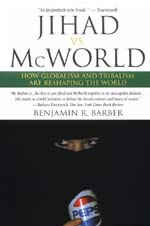 (Reprinted with permission from The Economist.)
(Reprinted with permission from The Economist.)
The proverbial visitor from Mars might well be scratching its antennae. In Hollywood, Disney mates with ABC, bringing forth a new media colossus worth billions of dollars in airwaves, images, and sounds. Meanwhile in the Balkans, it is Croats routing Serbs massacring Muslims, as snipers wearing Nike sneakers and Walkmans lay waste to Sarajevo—all of them Westerners acting in the name of cultural identity.
Many others have observed that the world seems simultaneously to be falling apart and coming together. Benjamin Barber, a political scientist at Rutgers University, argues that the two processes are linked and that both threaten to undermine democracy. His title, Jihad vs. McWorld, brings together two seismic forces. McWorld (“consumerism capitalism”) is the universe of manufactured needs, mass consumption, and mass infotainment. It is motivated by profits and driven by the aggregate preferences of billions of consumers. Jihad is shorthand for the fierce politics of religious, tribal, and other zealots. In its most extreme manifestations—in the ultranationalism of Vladimir Zhirinovsky’s Russia, for example, or the balkanization of the Balkans—it counters McWorld’s centrifugal pull and bloodless calculation.
Although some countries or parts of countries fit into one or other category, Jihad and McWorld are not so much places as reactions to experience and attitudes of mind. As Barber provocatively puts it: “Belonging by default to McWorld, everyone is a consumer; seeking a repository for identity, everyone belongs to some tribe. But no one is a citizen.”
He accepts that people’s material needs must be met, and believes that capitalism has done a better job in fulfilling these needs than any other system yet invented. But he also believes that this success has its costs. McWorld represents “a politics of inadvertence and unintended consequences, in which the seemingly innocuous market quest for fun, creativity, and profits puts whole cultures in harm’s way and undermines autonomy in individuals and nations alike.” Cosmopolitan companies are tending to create global classes of haves and have-nots, with no sense of local community. Their advertising absorbs and reconstructs art and ideas as marketing tools.
To all this, Barber argues, “Jihad stands not so much in stark opposition as in subtle counterpoint. “It offers a negation of modernity and an affirmation of moral and spiritual values in the face of “‘the spiritual poverty of markets.’” Democracy, in Barber’s view, is on the losing end of both propositions. “Truly mixed economies in this century have always been mixed economies in which democratic governments have balanced the interests of economic utility and social justice.”
Above all, he argues, what has been lost in the clash of Jihad and McWorld is the idea of the public as something more than a random collection of consumers or an aggregation of special political interests or a product of ethnic politics. The alternative is the patient and determined cultivation of democratic civil society where people talk, reflect, and act not just as consumers or believers but as citizens striving for the common good, with the studied tentativeness and conscience that citizenship requires. Of course, this is not an easy task, still less a quick fix. As Mr. Barber says: “Democracy, like a good book, takes time.”
This unsigned review appeared originally in The Economist, from which it is reprinted with permission.
Appetizer
Still seduced by the Enlightenment’s faith in progress, both Hegel and Marx believed reason’s cunning was on the side of progress. But it is harder to believe that the clash of Jihad and McWorld will issue in some overriding good. The outcome seems more likely to pervert than to nurture human liberty. The two may, in opposing each other, work to the same ends, work in apparent tension yet in covert harmony, but democracy is not their beneficiary. In East Berlin, tribal communism has yielded to capitalism. In Marxist Engelsplatz, the stolid, overbearing figures of Marx and Engels face east, as if seeking solace from Moscow; but now, circling them along streets that surround the park that is their prison are chain eateries like T.G.I. Friday’s, international hotels like the Radisson, and a circle of giant billboards mocking them with brand names like Panasonic, Coke and Goldstar. New gods, yes, but more liberty?
—Jihad vs. McWorld